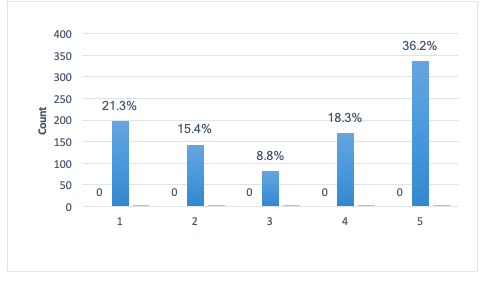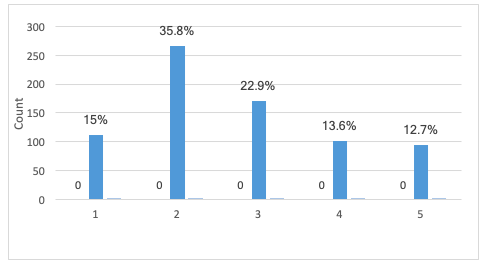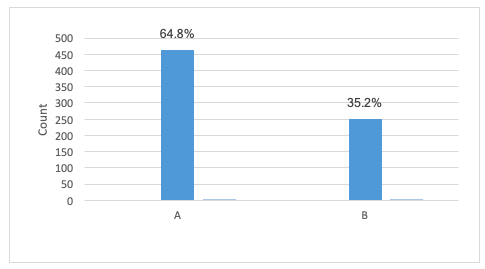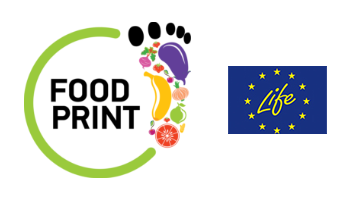FOODPrint Awareness campaign – 5th Online research on food waste

As part of the LIFE – FOODPRINT project ‘Awareness – raising campaign to prevent and manage food waste among consumers, the food and hospitality industries’, the 5th online survey on food waste was conducted with the aim of analysing public views on reduction strategies of food waste. The poll was conducted online through Dias Group websites (Sigmalive, Sportime.com.cy, I love style, City.com.cy, Check In, Economy today, MyCyprusTravel.com) between 19/11/2021 and 26/11/2021 . The sample for each question ranged from 716 to 930 people depending on the response. A percentage of participants do not live in Cyprus. Each question gave alternative options for its answer. The research examined the public’s habits regarding food preservation and storage, in order to understand whether habits that can potentially reduce food waste are common or not.
Below is the analysis and description of the food preservation questions. The first question of the poll was: “How often do you keep fruits and vegetables in the freezer so that they do not spoil?”. Table and figure 1 below show the results.
1. How often do you keep fruits and vegetables in the freezer so that they do not spoil?
| Answer | Count | % | |
| 1 | Constantly | 198 | 21.30% |
| 2 | Fairly often | 143 | 15.40% |
| 3 | Occasionally | 82 | 8.80% |
| 4 | Rarely | 170 | 18.30% |
| 5 | Never | 337 | 36.20% |
| Total: | 930 |

Table and figure 1: Results of the 1st poll question
From the answers given the highest percentages are at the two ends. Specifically, the majority (36.2%) never adopt the habit of storing fruits and vegetables in the freezer and the next highest percentage (21.3%) stated that they “constantly” adopt this habit. We could conclude from these answers that this habit is not widespread. If we compare the answers at the two ends, 36.7% of the respondents keep fruits and vegetables in the freezer “constantly” and “fairly often” while at the other end 54.5% adopt this habit “rarely” and “never”. It could be further investigated whether freezing fruits and vegetables is a well known habit, to distinguish whether people are aware of the habit and do not adopt it or if people are not aware of the habit and hence do not adopt it. For certain types of food such as vine leaves, broccoli, carrots, and olives it is well known in Cyprus that they can be preserved in the freezer, however with proper preparation many more vegetables and fruits can be preserved in the freezer such as zucchini, beans and tomatoes, if boiled, and grapes, oranges and other fruits can be kept chopped and in freezer bags.
The second question refers to the knowledge of ways of storing food to maximise its shelf life. Specifically, the question was: “How well do you know the proper way to store food in order to maximise its shelf life?”. Table and figure 2 below show the results.
2. How well do you know the proper way to store food in order to maximise its shelf life?
| Answer | Count | % | |
| 1 | Very well | 111 | 15.00% |
| 2 | Well enough | 266 | 35.80% |
| 3 | Somewhat | 170 | 22.90% |
| 4 | Not that well | 01 | 13.60% |
| 5 | Not well at all | 94 | 12.70% |
| Total: | 742 |

Table and Figure 2: Results of the 2nd poll question
As it seems, the answers turn to “well enough” with the highest percentage of 35.8%, while another 15% answered “very well”. Only 12.7% answered “not well at all” in this case. Overall, the results look positive in terms of knowledge of ways to maximise the shelf life of food since 50.8% of respondents know “very well” and “well enough”, while only 26.3% know “not well at all” and “not that well”. Of course, there are many ways of storing food and the answer in this case is subjective. What is more prominent here is the people’s perception of themselves about their knowledge on this subject. What we do not know and could be further analysed in this case is whether what people say they know are also habits they actually adopt. We may encounter here one of those cases where self-declaration differs from actual behavior, or intention differs from action.
The third question was about managing leftover food. Specifically, the question was: “Do you consider how to manage your leftovers before you cook, or order food?”. Table and figure 3 below show the results.
3. Do you consider how to manage your leftovers before you cook, or order food?
| Answer | Count | % | |
| Α | Yes, I know in advance what I will do with what is left | 464 | 64.80% |
| Β | No, I do not worry in advance what I will do with the food that will be left | 252 | 35.20% |
| Total: | 716 |

Table and Figure 3: Results of the 3rd poll question
The results show that most respondents (64.8%) know in advance what they will do with any leftover food while on the contrary 35.2% of respondents do not worry in advance about what they will do with the leftover food when they cook or order. This question explores whether people are concerned about wasting food before they start cooking, or ordering food, or whether they do not take this issue into account at all. Of course, the answer does not determine whether the way of storing and disposing of the leftovers will help reduce waste, but the fact that the majority of participants say that they are aware of this issue and are concerned about it from the beginning, increases the chances of reducing food waste.



